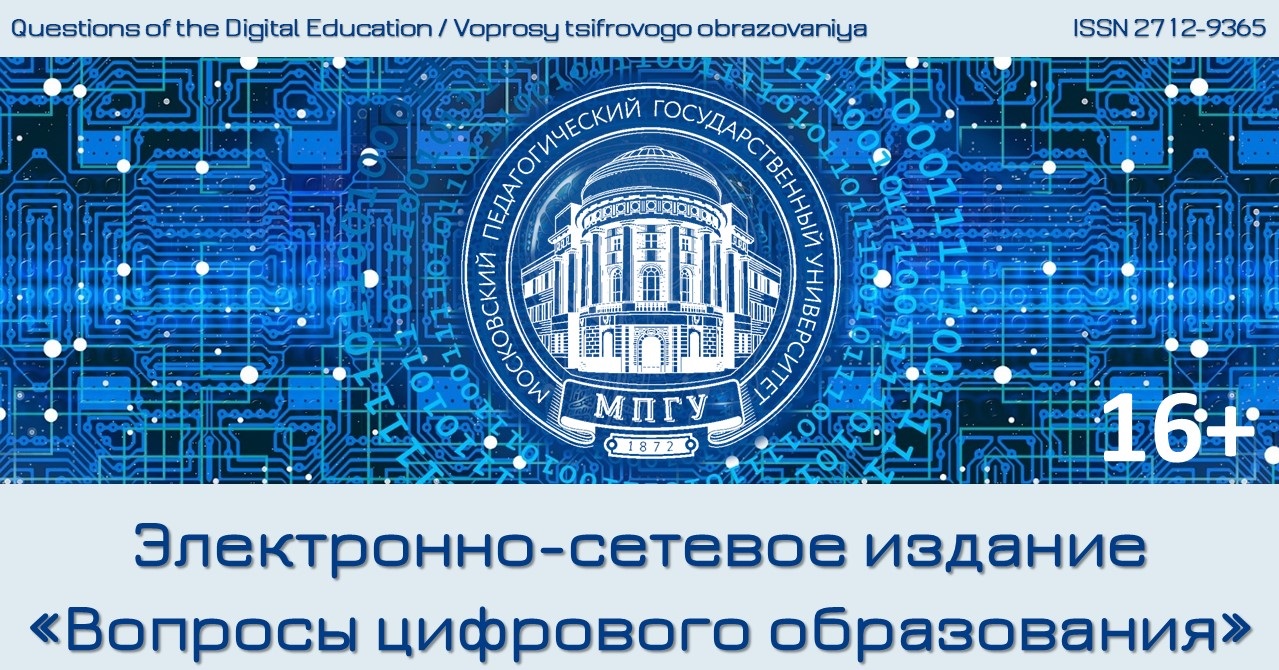Rules for sending, reviewing and publishing scientific articles in the electronic network publication “Questions of the Digital Education”.
1. The publication reviews and checks through the Anti-Plagiarism system (taking into account the specifics of the branches of knowledge) all materials received by the editorial office for the purpose of their expert evaluation.
2. The authors submit to the editors the manuscript of the article, drawn up in accordance with the “Requirements for the submission of manuscripts”. Articles that do not correspond to the subject of the scientific direction of the journal and are not properly designed are not accepted for consideration.
2.1. Authors of materials that do not meet these conditions are informed of the decision, indicating the reasons for refusing to accept manuscripts.
2.2. Materials that meet these conditions are sent for review to the members of the editorial board of the journal who are in charge of this topic.
2.3. All reviewers are recognized experts in the subject of the peer-reviewed materials and have publications on the subject of the peer-reviewed article over the past 3 years.
3. Reviewers are notified that the manuscripts submitted to them are the intellectual property of the authors and are classified as confidential information. Reviewers are not allowed to make copies of articles for their own needs.
4. The journal respects the confidentiality regime and the rules of “blind” anonymous review. The interaction of authors and reviewers is carried out only through the editorial staff.
5. The editorial board of the publication sends copies of reviews or a reasoned refusal to the authors of the submitted materials, and also undertakes to send copies of reviews to the Ministry of Education and Science of the Russian Federation upon receipt of a corresponding request by the editorial office of the publication.
6. The review is provided to the author of the manuscript without a signature and indication of the name, position, place of work of the reviewer.
7. Reviews are kept in the editorial office for 5 years.
8. The review should reflect the assessment:
- relevance of the topic and originality of its disclosure;
- the most important aspects of the article, its theoretical and/or practical significance;
- the validity of the conclusions formulated by the authors;
- the correctness of the use of the mathematical apparatus;
- clarity and comprehensibility for the reader of the style of presentation;
- completeness and correctness of the bibliography.
In the final part of the review, a clear recommendation should be given on its publication in the submitted form, or on the need for its revision and revision in the following wording:
- recommend the manuscript for publication;
- recommend the manuscript for publication with minor changes, without sending it for re-review;
- to recommend to consider the manuscript after the author eliminates the comments of the reviewer, with subsequent referral for re-review;
- refuse to publish the manuscript.
9. The article, finalized or revised by the authors, is re-sent for review along with its original version as soon as possible. An article delayed for a period of more than three months or requiring re-processing is considered as newly received. Manuscripts rejected as a result of peer review are not re-reviewed.
10. The decision to publish an article in a particular issue of the journal is made by the Deputy Editor-in-Chief.
11. The Deputy Editor-in-Chief brings the decision to the attention of the author.
12. In case of disagreement with the opinion of the reviewer, the author of the article has the right to apply to the editorial office with a reasoned request to send his manuscript for review to another reviewer, with appropriate arguments in circulation. In this case, the editors of the journal send the manuscript for re-review, or provide the author with a reasoned refusal.
13. The maximum period of review – from the date of receipt to the issuance of a decision – is 3 months.
14. Authors are not charged for reviewing articles.
15. The editorial board reserves the right to shorten and scientifically edit articles.
